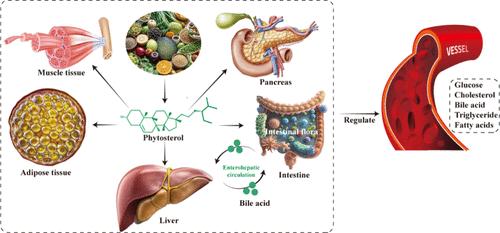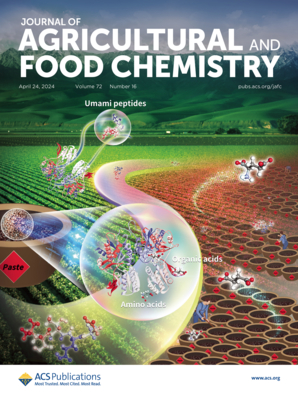植物甾醇对糖脂代谢的有益作用及其机制综述
IF 6.2
1区 农林科学
Q1 AGRICULTURE, MULTIDISCIPLINARY
引用次数: 0
摘要
植物甾醇广泛分布于坚果、谷物、蔬菜等各种植物食品中。由于植物甾醇具有出色的降低胆固醇效果,因此被广泛应用于功能食品、保健品和药品中。除了降低胆固醇的作用外,植物甾醇最近还被发现对糖脂代谢产生有益影响,而糖脂代谢是导致糖尿病、心血管疾病和脂肪肝等多种代谢性疾病的原因之一。不断开发单一靶点的新药并不能有效遏制代谢性疾病和并发症(如多器官损伤)的发生,而植物甾醇因其多种生物活性,尤其是通过多靶点调节糖脂代谢的作用,引起了人们的特别关注。本综述全面综述了植物甾醇对糖脂代谢的影响及相关机制。我们还回顾了植物甾醇在治疗糖尿病和非酒精性脂肪肝这两大代谢性疾病方面的最新进展。这篇综述有助于扩展人们对植物甾醇治疗混合型血脂异常和相关代谢疾病潜力的认识。本文章由计算机程序翻译,如有差异,请以英文原文为准。

A Comprehensive Review of Beneficial Effects of Phytosterols on Glycolipid Metabolism and Related Mechanisms
Phytosterols are widely distributed in various plant foods, such as nuts, grains, vegetables, and so on. Phytosterols have been broadly applied in functional foods, supplements, and pharmaceutical products due to their excellent cholesterol-lowering effect. Besides the cholesterol-lowering effect, recently, phytosterols have been found to exert a beneficial effect on glycolipid metabolism, which contributes to multiple metabolic diseases, such as diabetes, cardiovascular disease, and fatty liver. Constant development of new drugs with a single target fails to effectively curb the occurrence of metabolic diseases and complications, such as multiple organ damage, and phytosterols attract special attention due to varieties of biological activities, especially the regulation of glycolipid metabolism through multiple targets. Present review gives a comprehensive review of the effects of phytosterols on glycolipid metabolism and related mechanism. We also review the promising update of phytosterol in the treatment of two major metabolic diseases, including diabetes and nonalcohol fatty liver disease. This review can help to extend the understanding of the potential of phytosterols for mixed dyslipidemia and related metabolic diseases.
求助全文
通过发布文献求助,成功后即可免费获取论文全文。
去求助
来源期刊
CiteScore
9.90
自引率
8.20%
发文量
1375
审稿时长
2.3 months
期刊介绍:
The Journal of Agricultural and Food Chemistry publishes high-quality, cutting edge original research representing complete studies and research advances dealing with the chemistry and biochemistry of agriculture and food. The Journal also encourages papers with chemistry and/or biochemistry as a major component combined with biological/sensory/nutritional/toxicological evaluation related to agriculture and/or food.

 求助内容:
求助内容: 应助结果提醒方式:
应助结果提醒方式:


